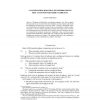Free Online Productivity Tools
i2Speak
i2Symbol
i2OCR
iTex2Img
iWeb2Print
iWeb2Shot
i2Type
iPdf2Split
iPdf2Merge
i2Bopomofo
i2Arabic
i2Style
i2Image
i2PDF
iLatex2Rtf
Sci2ools
CORR
2002
Springer
2002
Springer
A continuation semantics of interrogatives that accounts for Baker's ambiguity
Wh-phrases in English have two important properties: first, they can appear both raised and in-situ; second, while in-situ wh-phrases can take semantic scope beyond the immediately enclosing clause, raised ones cannot. I present a denotational semantics of interrogatives that naturally accounts for these two properties; it neither conducts movement at a level of semantic representation separate from surface syntax nor posits lexical ambiguity between raised and in-situ occurrences of the same wh-phrase. My analysis is based on the concept of continuations; in particular, it uses a novel type system for higher-order continuations to handle wide-scope wh-phrases while remaining within a Montague-style framework of grammar. This treatment sheds light on the combinatorics of interrogatives as well as other kinds of so-called A -movement.
CORR 2002 | Education | Important Properties | In-situ | Semantic |
| Added | 18 Dec 2010 |
| Updated | 18 Dec 2010 |
| Type | Journal |
| Year | 2002 |
| Where | CORR |
| Authors | Chung-chieh Shan |
Comments (0)

